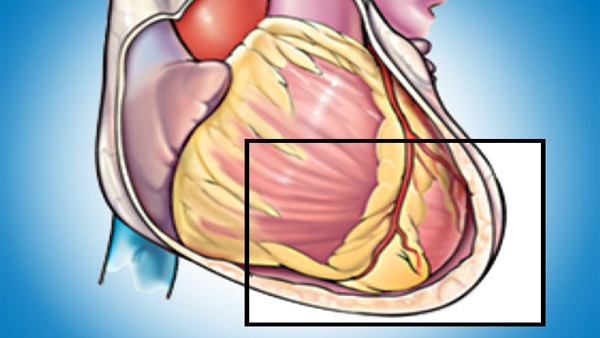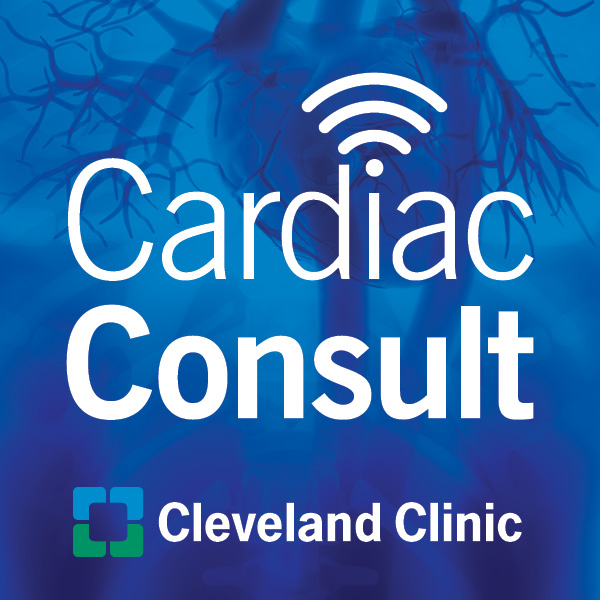RHAPSODY Trial Results: Recurrent Pericarditis with Rilonacept

Dr. Allan Klein, Director of Cleveland Clinic'ss Pericardial Disease Center, provides the results of the RHAPSODY trial, a pivotal Phase 3 trial that evaluated rilonacept, an interleukin 1-alpha; and 1-beta; inhibitor, compared with placebo among patients with recurrent pericarditis. Study design and findings are provided, as well as implications for future care for patients with pericarditis.
Read the article on Consult QD - and the full research article at Klein AL, Imazio M, Cremer P, et al., on behalf of the RHAPSODY Investigators. Phase 3 Trial of Interleukin-1 Trap Rilonacept in Recurrent Pericarditis. N Engl J Med 2020; Nov 16.
Subscribe: Apple Podcasts | Buzzsprout | Spotify
RHAPSODY Trial Results: Recurrent Pericarditis with Rilonacept
Podcast Transcript
Announcer:
Welcome, to Cleveland Clinic Cardiac Consult, brought to you by the Sydell and Arnold Miller Family Heart, Vascular and Thoracic Institute at Cleveland Clinic.
Dr. Allan Klein:
My name is Dr. Allan Klein from the Cleveland Clinic, director for the Center for Pericardial Diseases, and it's my great pleasure to present the results of the RHAPSODY trial. This is the pivotal phase three trial of patients with recurrent pericarditis. I'd like to acknowledge my co-principal investigator from Italy, Dr. Massimo Imazio, as well as the other authors, investigators, and staff. And of course, a special thank you for the patients participating in this study. And my disclosures can be found in this slide.
Now, I'd like to talk about recurrent pericarditis. Recurrent pericarditis is a debilitating disease with no FDA approved therapies. Typically, the disease is managed with a combination of NSAIDs, something like Ibuprofen, Colchicine, and Prednisone. Long-term steroid use and the associated morbidity are concerns in many patients with recurrent pericarditis. Interleukin-1 has been implicated as a mediator of recurrent pericarditis. Rilonacept is a once-weekly subcutaneously administered Iowan alpha and Iowan beta cytokine trap.
Let me talk about the design of the RHAPSODY trial. RHAPSODY was designed to test the hypothesis that monotherapy rilonacept would be sufficient to resolve active episodes of pericarditis and reduce the risk of pericarditis recurrence. RHAPSODY was unique and Utilize a randomized withdrawal design acutely symptomatic patients with pericarditis that were failing their background medicine were rolled in a single, In a 12 week single blind run-in period as shown over here, during which they receive weekly rilonacept, or other pericarditis medications such as steroids, cortisone or taper and discontinue. Now clinical responders on this monotherapy rilonacept were then randomized one-to-one to continue to rilonacept or placebo in a double-blind event-driven randomized withdrawal period. The primary efficacy endpoint of their trial was time to first adjudicated pericarditis recurrence patients who experienced a recurrence can be given open label rilonacept, bail over a rilonacept and remain in the study.
The secondary end points related to patient symptoms and quality of life are listed here. Eligible patients continue in an open label rilonacept in a long-term extension period which is ongoing. Now let's look at the demographics and clinical characteristics of our patients. RHAPSODY was a very bad well balanced study and all patients were representative of the real-world pericarditis population. The mean number of episodes, pericarditis episodes was 4.7. Patients were experiencing acute recurrence, despite 80% treated with colchicine and almost half with steroids, patients and role were experiencing lot of serious disease with pericarditis, the pericarditis pain, we're just over six out of 10 on a NRS scale. And C-reactive protein was elevated at six milligrams per deciliter, and other objective evidence of pericarditis manifestations were represented as expected. So this is the concert diagram of our, of our patients of our trial of 86 enrolled patients, 79 completed the run-in period of those 61 patients were randomized, in the randomized withdrawal period and the long-term extension period is ongoing.
Now the results, as you can see, rilonacept initiation resulted in a rapid resolution of the acute episode during the run-in period, we saw very rapid and sustained reduction in both report, a pain and purple and CRP inflammation in gray. As soon as after the first dose, the median time to pain response was five days and the median time to CRP normalization was seven days. All patients were receiving steroids, the baseline successfully tapered off and transitioned to monotherapy rilonacept within eight weeks. The study met the primary efficacy endpoint as shown on the slide, in total 25 events accrued two in the rilonacept arm and 23 in the placebo arm. The median time to fruits, adjudicated pericarditis recurrence in placebo patients was 8.6 weeks after randomization. And almost half of those who went on to suffer recurrence did so within the first month, in contrast in the rilonacept arm, the median time to recurrence couldn't be calculated as there were not enough events.
There are only two recurrences in the rilonacept arm, and both occurred after brief temporary study drug interruption. The hazard ratio was 0.04 with a highly statistically significant p-value of less than 0.0001. This corresponds to a very dramatic 96 percent reduction in the risk of a recurrent pericarditis event. There were no reported recurrences for the remainder of the randomized withdrawal period in patients receiving Biola, rilonacept, the annualized incidence of recurrence on treatment was reduced compared to pre-study. Now the secondary end points, all three major secondary efficacy end points at week 16 were highly statistically significant four times as many rilonacept recipients maintained clinical response compared to placebo recipients, from a patient quality of life perspective. 81 percent of patients receiving rilonacept report absence or minimal pericardial symptoms get compared with 25 percent, of placebo recipients and rilonacept recipients reported 98 percentof trial, being pain-free at most experienced, minimal pain versus 46 percent in the placebo arm for all three endpoints.
The sensitivity analysis were consistent out to week 24 with curve separation as early as week eight in general, rilonacept was generally well tolerated events were consistent with the known safety profile rilonacept. There were no drug related, serious adverse events and no deaths, none serious AEs in four patients led to discontinuation all during the run-in period. The most common events were injection site reactions and upper respiratory tract infections, in conclusion and RHAPSODY in patients with symptomatic recurrent pericarditis failing standard of care therapy. These data demonstrate a very robust treatment response to rilonacept, including rapid resolution of acute pericarditis episodes. After the first dose, of rilonacept, the prevention of recurrence as well on treatment with a 96 percent relative risk reduction. The successful weaning of treated patients off can comment standard treatments for pericarditis, including steroids and following improve quality of life with 98 percent of trial days when none or minimal pericarditis pain.
From the perspective of the current sequential treatment algorithm for recurrent pericarditis management in 2020, these data corrupt represented actually a paradigm shift in that rilonacept only provide a steroid sparing option to half the study population who are on steroids of study entry, but also prevent potentially obviate the need for initiation of steroids in patients who are experiencing a recurrence despite Colchicine. So in summary, ladies and gentlemen for physicians and patients out there instead of giving steroids, we may have another option, giving monotherapy rilonacept to help these patients that have a lot of disabling chest pain and, and the future to mention with this presentation, dealing with the journal, published this article as well. Thank you very much for that.
Announcer:
Thank you for listening. We hope you enjoyed the podcast. We welcome your comments and feedback. Please contact us at heart@ccf.org. Like what you heard? Subscribe wherever you get your podcasts or listen at clevelclinic.org/loveyourheartpodcast.

Cardiac Consult
A Cleveland Clinic podcast exploring heart, vascular and thoracic topics of interest to healthcare providers: medical and surgical treatments, diagnostic testing, medical conditions, and research, technology and practice issues.



